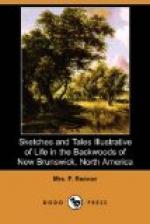New Brunswick is partly settled by French Acadians from the adjoining province of Nova Scotia, but these, generally speaking, form a race by themselves, and mingle little with the others, still retaining the peculiarities of their nation, although long separated from it—they like gaiety and amusement more than work, and consequently are rather poorer than the other inhabitants; but, of course, there are exceptions. In the winter I have often seen them on their way to market, with loads of frozen oysters, packed in barrels, and moss cranberries (rather a chance crop); but they looked happy and comfortable, and went singing merrily to the ringing of their horse bells. The French were the pioneers of the province, and often had to do battle with the Indians, the ancient possessors of the soil: of these last there now remains but a fast-fading remnant—objects more of pity or laughter than of dread. Of the other original settlers, or, as they are particularly termed, “blue noses,” they are composed of the refugees and their descendants, being those persons who, at the separation of England from America, prefering the British government, sought her protection and came, another band of pilgrims, and swore fealty to that land from whence their fathers had so indignantly fled—they are certainly a most indescribable genus those blue noses—the traces of descent from the Dutch and French blood of the United States, being mingled with the independent spirit of the American and the staunch firmness of the “Britisher,” as they delight to call themselves, showing their claim to it by the most determined hatred of the Yankees, whose language and features they yet retain: yet these differing qualities blend to form a shrewd, intelligent, active, and handsome people—intelligence and strong sense, to a far greater amount than could be found in persons of the same class in England. A trace, albeit a faint one of the Saxon serf, still lingers with the English peasant; but the free breeze of America soon sweeps the shadows from his brow, and his sons all, proudly take their place as men, knowing that by their own conduct and talents they may work their way to fortune, or, at least, “rough hew” it, without dread that the might of custom’s icy breath can blight their fate for lack of birth or fortune. This gives a noble feeling to the heart and a higher tone to the character, although a sense of the ridiculous is often attached to this by a native of the old countries, when it is shown forth by the “squire” yoking his oxen, a major selling turkies, and the member for the county cradling buckwheat. Yet all this is productive of good, and opens a path for intellect and genius, and when a colonel and member of the Legislative Council eats pancakes and molasses in a friendly way with his poorer neighbours, is it not likely (as the Persian fable tells us of the pebble lying near the rose, and thereby imbibing some of its fragrance) that some of the graces and politeness of the higher




